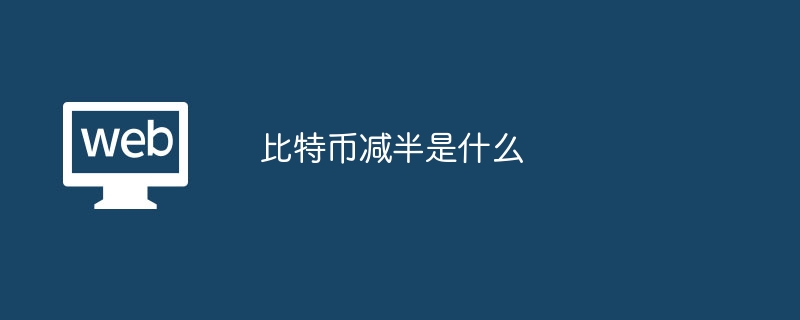What is Bitcoin Halving?
- 全网都在看Original
- 2024-04-18 10:34:54656browse
Bitcoin halving refers to the process of halving Bitcoin rewards every four years to control the amount of issuance. The way the mechanism works is that every four years the reward for miners to verify a block is cut in half, from the original 50 Bitcoins to the current 6.25 Bitcoins. Halving reduces supply, increases Bitcoin value, stimulates competition among miners, and slows inflation.

Bitcoin Halving
What is Bitcoin Halving?
Bitcoin halving refers to the process in which Bitcoin rewards are halved. This is a mechanism built into the Bitcoin network to control the issuance of Bitcoin.
How does the halving mechanism work?
Every time a miner successfully verifies a Bitcoin block, they are rewarded with a certain number of Bitcoins. Initially, this reward was 50 Bitcoins. Approximately every four years, this reward is halved.
Halving schedule:
- 2009: 50 Bitcoins
- 2012: 25 Bitcoins
- 2016: 12.5 Bitcoin
- 2020: 6.25 Bitcoin
- The next halving is expected in 2024: 3.125 Bitcoin
Minus The impact of the halving
The Bitcoin halving has a significant impact on the market. It will:
- Reduce the supply of Bitcoin: The halving will reduce the number of new Bitcoins entering circulation, resulting in a reduction in supply.
- Increase Bitcoin Value: As supply decreases, market demand for Bitcoin may increase, causing its value to rise.
- Stimulate miner competition: As rewards are halved, miners will need to find other ways to profit, which may increase competition and improve the security and stability of the Bitcoin network.
- Slow Inflation: Halving helps control Bitcoin’s inflation because it limits the supply of new Bitcoins.
The above is the detailed content of What is Bitcoin Halving?. For more information, please follow other related articles on the PHP Chinese website!
Related articles
See more- Ransomware Bitcoin Worm Solution
- How to use PHP to develop applications using the Bitcoin Coinbase wallet library (detailed steps)
- Bitcoin Halving Countdown Guide: Essential Knowledge for Newbies
- What is the difference between USDT and Bitcoin?
- How to check if you have bought Bitcoin? How to check if you have bought Bitcoin?

